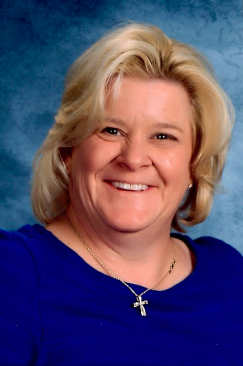Why I Love PLCs: Power in Purpose
Why I Love PLCs: Power in Purpose

By Stacey Riendeau, principal of Heritage High School
When assessing the positive impact PLCs have had at Heritage High School (HHS), the one phrase that comes to mind is power in purpose. PLCs have empowered our teachers to shift their thinking from "what I teach" to "who I teach." Having consistent time to create a guaranteed viable curriculum, agreed-upon essential learnings, and meaningful common assessments has allowed our teachers to use data points to identify students who require targeted interventions or extensions of concepts. Our model of a built-in, four-day-a-week advisory/enrichment period has allowed our teachers to use their collaborative teams to identify students in need and to act quickly to provide those students with immediate resources and assistance. The timeliness and consistency of ensuring student understanding really helps our students stay on track academically.
This is true academic PLC work, and HHS teachers have taken this concept to the next level. We have layered this academic work with an intense focus on the social, emotional, and mental well-being of our students. Our teams now emphasize and empathize with "the why" for all of our students. PLC work became increasingly more powerful at HHS when our teachers began to fully understand that there is always a reason for a student's successes, struggles, and failures.
Our PLC work grew organically into buildingwide conversations akin to the RTI process. Teachers in every content area came together on diverse cross-curricular teams to look at students through a much more holistic lens. As a staff, we started to dig into students and their academic, social, and emotional histories to discover what caused a student's success level to change and when this shift occurred. With a deeper understanding of academic data, as well as a variety of additional social-emotional learning data points, we, as a staff, began asking students--and each other--different questions. Instead of blaming student struggles on outside influences, we created systems to address students' most basic needs, from food, shelter, and clothing to technology resources and utilities assistance. We became more focused on who students are as people and how we can individualize our approach to meeting their postsecondary goals and aspirations.
This led to teachers in every content area joining forces to teach cross-curricular skills no matter the content area. Having teacher leaders understand and provide ownership and voice to the collective mission of student success created a mentality for staff that we would all be responsible for and rally around our students. Our PE teachers now intentionally embed math and science into their classes, and our practical arts teachers create capstones for career readiness that highlight math and language arts standards for graduation competencies. This buildingwide journey to discover our students' various academic pathways has led to powerful and difficult conversations about everything from gradebooks to schedule changes to adding a variety of supports for all students.
I vividly remember sitting in many collaborative and case-study teams and being so proud of the collegial conversations and philosophical debates surrounding the examination of standards, instructional strategies, gradebook expectations, and the best approaches to ensuring students understand content, its relevance, and its application.
For me, the true power in PLCs is the shared collective purpose that all students should and will find success. When all content-area educators come together to share ideas, analyze data, and find solutions for kids, we truly become a team instead of working in isolation as individual educators. These powerful collaborative structures have allowed me to hear one of the greatest phrases an educator could ever hear. As a rising senior who had previously struggled finally met graduation competencies in math and language arts, he proudly exclaimed, "Wow, I really am good at school."
What do PLCs mean to me? They mean student success, being part of a true team of educators, and an ownership from everyone in the school that all kids will become the best versions of themselves. PLCs move us from "we think we can" to "we know we can!" In that moment, there is true power in purpose.
This article was originally published February 1, 2021 in All Things PLC magazine. Used with permission. From AllThingsPLC Magazine, Winter 2021 issue. Copyright 2021 by Solution Tree Press, 555 North Morton Street, Bloomington, IN 47404, 800.733.6786, SolutionTree.com. All rights reserved.
